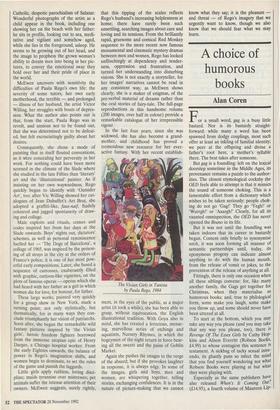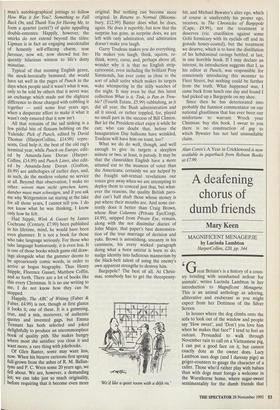A choice of humorous books
Alan Coren
For a small word, gag is a busy little bastard. Nor is its bastardy straight- forward: while many a word has been spawned from dodgy couplings, most such offer at least an inkling of familial identity; we peer at the offspring and divine a father's root here, a mother's syllable there. The brat takes after someone.
But gag is a foundling: left on the lexical doorstep sometime in the Middle Ages, its provenance remains a puzzle to the author- ities. The closest etymological cockshy the OED feels able to attempt is that it mimics the sound of someone choking. This is a lamentable effort from a dictionary which wishes to be taken seriously: people chok- ing do not go 'Gag!' They go `Yegh!' or `Wurrgh!' or `Aaargh!' Clearly, for all its vaunted omnispection, the OED has never opened the Beano in its life.
But it was not until the foundling was taken indoors that its career in bastardy began. Content only briefly to synonymise retch, it was soon forming all manner of semantic partnerships until, today, its eponymous progeny can indicate almost anything to do with the human mouth, from the release of vomit or jokes, to the prevention of the release of anything at all.
Fittingly, there is only one occasion when all these siblings convene: for, like many another family, the Gags get together for Christmas, when they materialise as humorous books; and, true to philological form, some make you laugh, some make you throw up, and some should never have been uttered at all.
To start at the bottom, which you may take any way you please (and you may take that any way you please, too), there is Revenge Of The Essex Girls by Cathy Hop- kins and Alison Everritt (Robson Books, £4.99) to whose contagion this sentence Is testament. A sickbag of tacky sexual innu- endo, its ghastly puns so infect the mind that you find yourself wondering not what Robson Books were playing at but what they were playing with.
Especially as the same publishers have also released When's It Coming Out? (£14.95), a fourth volume of Maureen Lip- man's autobiographical jottings to follow How Was it for You?, Something to Fall Back On, and Thank You for Having Me, to form a quartet (octet?) of quite appalling double-ententes. Happily, however, the smirks do not extend beyond the titles: Lipman is in fact an engaging anecdotalist of honestly self-effacing charm, now farceuse, now wit, now shrewd but fre- quently hilarious witness to life's dotty minutiae.
Typical of that teeming English genre, the mock-heroically bemused, she would have sat well in the pages of Punch in the days when people said it wasn't what it was, only to be told by others that it never was; an exchange which made not the slightest difference to those charged with cobbling it together — until some four years ago, when a desperate effort to make it what it wasn't only ensured that it now isn't. All that remains of the sad sinking is a few pitiful bits of flotsam bobbing on the Yuletide: Pick of Punch, edited by David Thomas (HarperCollins, £14.99) repre- sents, God help it, the best of the old rag's terminal year, while Punch on Europe, edit- ed by Amanda-Jane Doran (Harper- Collins, £14.99) and Punch Lines, also edit- ed by Amanda-Jane Doran (Grafton, £6.99) are anthologies of earlier days, and, as such, do the modern volume no service at all. Beyond that observation, I make no other: wovon man nicht sprechen kann, daruber muss man schweigen, and if you ask me why Wittgenstein sat staring at the lake for all those years, I cannot tell you. I do not know what he was thinking, I know only how he felt.
Had Stipple, Wink & Gusset by James Cochrane (Century, £7.99) been published in his lifetime, mind, he would have been even glummer. It is not a book for those who take language seriously. For those who take language humorously, it is even less. It is one of those books which gums old draw- ings alongside what the gummer deems to be uproariously comic words, in order to arrive at bogus biography. Thus Henry Stipple, Florence Gusset, Matthew Coffin, and so forth. There are a lot of books like this every Christmas. It is no use writing to me, I do not know how they can be stopped. Happily, The ABC of Writing (Faber & Faber, £4.99) is not, though at first glance it looks it, one of these. It is a gumming, true, and a mix, moreover, of authentic quotes and invented gags, but Emma Tennant has both selected and joked delightfully to produce an uncommonplace book of quality pith. She makes hungry where most she satisfies: you close it and want more, a rare thing with jokebooks. Of Glen Baxter, some may want less, now. When his bizarre cartoons first sprang full-grown from the ashes of R. M. Ballan- tyne and P. C. Wren some 20 years ago, we fell about. We are, however, a demanding lot; we can take just so much originality, before requiring that it become even more original. But nothing can become more original. In Returns to Normal (Blooms- bury, £12.99) Baxter does what he does, again. He does it superbly, but now that the surprise has gone, as surprise does, we are left with only admiration, and admiration doesn't make you laugh.
Garry Trudeau makes you do everything. He makes you laugh, think, squirm, re- think, worry, curse, and, perhaps above all, wonder why it is that no English strip- cartoonist, even including the brilliant Posy Simmonds, has ever come as close to the sort of adult satire which makes its targets wake whimpering in the stilly watches of the night. It may even be that this latest collection What is it, Tink, is Pan in Trou- ble? (Fourth Estate, £5.99) rubbishing, as it did all year, the Bush administration and all it stood, or rather toppled, for, played no small part in the success of Bill Clinton. But let the President-elect enjoy it while he can; who can doubt that, before the Inauguration Day balloons have wrinkled, Trudeau will have him on toast, too?
What we do do well, though, and well enough to give its targets a sleepless minute or two, at least, is parody. It may be that the classridden English have a more attuned ear to the nuances of voice than the Americans, certainly we are helped by the fraught sub-textual revelations our voices give away when we are attempting to deploy them to conceal just that, but what- ever the reasons, the quality British paro- dist can't half shaft those whose money is put where their mouths are. And none cur- rently does it better than Craig Brown, whose Rear Columns (Private Eye/Corgi, £4.99), snipped from Private Eye, remain, along with the not dissimilar diaries of John Major, that paper's best demonstra- tion of the true marriage of derision and yuks. Brown is astonishing, uncanny in his canniness, his every wicked paragraph doing what a born satirist is born to do, nudge identity into ludicrous mannerism by the black-belt talent of using the enemy's own apparent strengths to destroy him. Bargepole? The best of all. At Christ- mas, somebody has to get the threepenny- `We'd like a quiet room with a déjà vu.' bit, and Michael Bywater's alter ego, which of course is unalterably his proper ego, receives, in The Chronicles of Bargepole (Cape, £9.99), not the treatment it deserves (viz. crucifixion against some Gobi formicary with its eyelids off and its gonads honey-coated), but the treatment we deserve, which is to have the distillation of his hebdominal ravings bottled, at last, in one horrible book. If I may declare an interest, its introduction suggests that I, as his editor at Punch, was responsible for consciously introducing this monster to Fleet Street, but nothing could be further from the truth. What happened was, I came back from lunch one day and found I had picked up a Bargepole on my shoe.
Since then he has deteriorated into probably the funniest commentator on our national ghastliness that has ever been our misfortune to warrant. Wreck your Chistmas: buy this book. I swear to you there is no construction of gag to which Bywater has not laid unassailable claim.
Alan Coren's A Year in Cricklewood is now available in paperback from Robson Books at f7.99.











































































 Previous page
Previous page